|
Much has changed since King IV came into effect on 1 April 2017 but, says the chair of the King Committee, Ansie Ramalho, its principles and practices are expressed at a sufficiently high level of generality to empower boards to apply them in the current circumstances.
“There have been a number of developments in the past few years that will influence how organisations are led and governed over the next decade and beyond,” says Ramalho. “We are currently reflecting on these developments and what they mean for corporate governance, and whether additional clarity or guidance might be required. At this stage, though, we believe that any update of King IV would be premature—especially given the ongoing developments relating to global reporting requirements and standards, as well as the pending Companies Act Amendment Bill.” One of the developments currently being debated by the King Committee is recent rapid advances in artificial intelligence and technology generally, which raise significant, complex risks and ethical issues. At a global level, regulations and standards that deal with sustainability disclosure by companies are also being introduced at an unprecedented speed. Environmental, social and governance (ESG) issues are re-emphasising the focus on the organisation’s purpose and are affecting corporate reporting and disclosure significantly. Human capital governance has become more complex as a new generation of employees enters the corporate world with a novel set of expectations, while the way organisations are run has changed significantly as working habits change in response to the COVID-19 lockdowns. Board composition is also a developing area, with consideration being given to greater stakeholder representation or other suitable mechanisms to enrich decision-making. In the South African context, the Companies Act Amendment Bill looks set to introduce significant amendments to the current Act. The Bill was issued for public comment in 2021, but no final version has yet appeared. However, its proposed provisions for strengthening oversight by social and ethics committees of companies’ social and environmental performance, its introduction of accountability mechanisms for the wage gap, and shareholder voting on remuneration are all clear signals of the prevailing mood, as is the cautionary statement in the Bill’s explanatory memorandum that regulation to include employees in governance structures is to follow. In the wake of the Zondo reports, the country’s greylisting and current geo-political concerns, South African organisations are particularly affected by governance issues relating to corruption, including money laundering, terrorism, and transparency regarding the true owners of a company. King IV unequivocally maintains that operating context needs to be accounted for in strategy development, risk management, performance and reward systems and reporting, but the balancing act is becoming increasingly difficult, says Ramalho. Businesses are increasingly being expected not only to mitigate external risks but to contribute proactively to not only the economies in which they operate but also the health of society and the planet. The move to incorporate ESG factors into investment decisions shows that so-called “non-financial” factors ultimately have financial consequences. Investors are increasingly taking into account the context in which a company operates. This balancing act between financial and non-financial factors is particularly difficult for South African companies. In the interests of their own survival, they are increasingly having to step into gaps created by the government’s inability to deliver key services. To attract investment, South African companies will need to demonstrate that they are able to survive in an overall environment which is fraught with threats and vulnerabilities, Ramalho believes. “I would like to assure all our stakeholders that the King Committee is keeping abreast of the evolving corporate governance trends and has been considering their potential impact on the King IV Report. While any formal update is premature at this stage, we stand ready to offer South African organisations any further insights or guidance that may be required as these trends unfold. We also envisage that this process will include stakeholder engagement,” she says. “The King Committee reaffirms its belief that corporate governance does not exist for its own sake, but as a way of building resilient and healthy companies that are fit for this complex operating context.” ENDS MEDIA CONTACT: Stephné du Toit, [email protected], 084 587 9933, www.atthatpoint.co.za For more information on the IoDSA please visit: Website: www.iodsa.co.za Twitter: @The_IoDSA LinkedIn: Institute of Directors South Africa Company Page Facebook: Institute of Directors South Africa
0 Comments
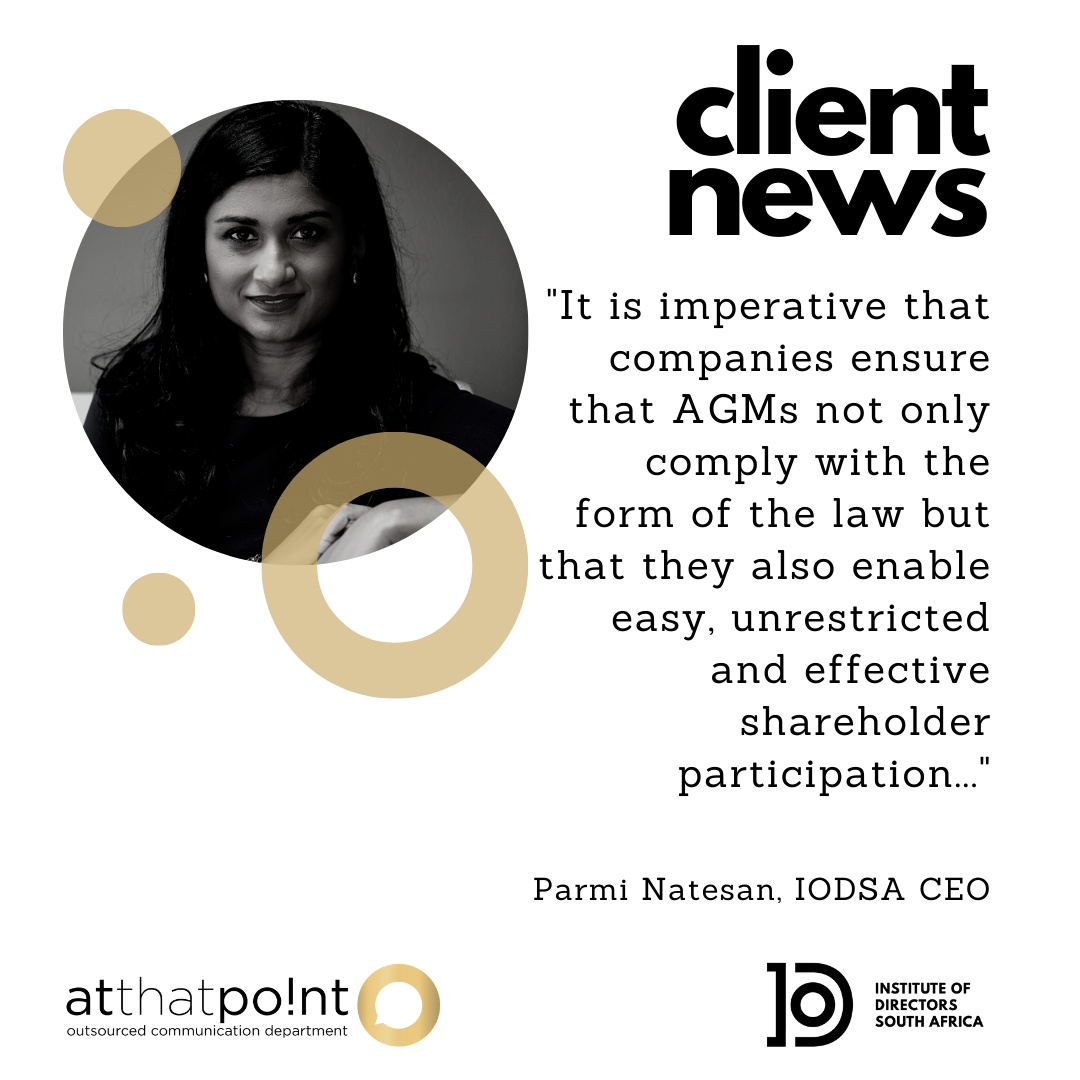 An Annual General Meeting (AGM) of a company that restricts shareholders to use only text-based communication does not constitute an AGM for the purposes of the Companies Act 71 of 2008. This is according to the legal opinion of the Companies and Intellectual Property Commission (CIPC) on holding AGMs via electronic means. According to the opinion, a company holding an AGM with shareholders attending online must allow those shareholders to verbally ask questions in real-time and without an intermediary. This aligns with the IoDSA’s previous comments on this matter, in which we noted that whilst the section does not specifically state that verbal communication is required, the spirit of the section should be interpreted to allow sufficient engagement at the AGM, as would have taken place had the meeting taken place in-person. The Institute of Directors in South Africa (IoDSA) welcomes this clarification from the CIPC. “If you consider the Companies Act and King IV in substance over form, shareholders should have a right to be heard at an AGMs,” says Parmi Natesan, CEO of the IoDSA. “It is imperative that companies ensure that AGMs not only comply with the form of the law but that they also enable easy, unrestricted and effective shareholder participation during the meetings, in substance.” “Whilst engagement between companies and shareholders can take place at any time, the AGM is the key point of formal engagement and the main opportunity for shareholders to exercise their voting rights, raise concerns and ask questions,” explains Natesan. A key, but often neglected voting resolution at AGMs is the appointment of directors. Shareholders have the legal right and obligation to appoint directors to oversee the company. Those directors, in turn, have a legal obligation to act in the company’s best interests and can be held personally liable if they do not do so. A big emphasis at AGMs should therefore be ensuring that the right people are appointed to the board and that they are held properly accountable. Shareholders need to be confident that they are appointing directors in whom they have full trust. They then need to allow these directors to exercise their discretion in the fulfilment of their duties while holding those directors accountable. They should also consider when the removal of a director is appropriate as this is another powerful and important tool that a shareholder has to protect the company’s interests. In relation to the AGM resolution on director appointments, questions asked should therefore be aimed at determining whether board members have the necessary knowledge, skills, experience, independence, personal competencies, track record and even sufficient time available to effectively serve on the board. “In summary, shareholders now have confirmation of their right to be heard at virtual AGMs and are encouraged to use their voice effectively in exercising their voting rights and holding the directors accountable,” says Natesan. ENDS MEDIA CONTACT: Stephné du Toit, [email protected], 084 587 9933, www.atthatpoint.co.za For more information on the IoDSA please visit: Website: www.iodsa.co.za Twitter: @The_IoDSA LinkedIn: Institute of Directors South Africa Company Page Facebook: Institute of Directors South Afric A recent editorial in Business Day raised a perennial governance hot potato: just how many boards should a single individual be able to serve on? The tenor of the article was that the current chair of Capitec should focus on that role, and risked being distracted by chairing two other boards as well.
“The view that the more complex and large an institution is, the more time the chair or board member should have to devote to it has some merit,” says Parmi Natesan, CEO, the Institute of Directors in South Africa. “For example, the decision by the current chair of Eskom to resign as chair of a large bank to concentrate on leading the power utility’s board was probably a wise move. “However, because organisations are of varying sizes and degrees of complexity, and individuals have different capacities, the IoDSA does not believe it makes sense to attempt to create a hard-and-fast rule about how many boards an individual should be able to chair or, indeed, sit on.” She argues that it remains up to each organisation to determine how much time each board member’s role requires, and to ensure that current or prospective board members can commit to that. The individual director’s ability, experience and capacity would also be factors to consider. In addition, board chairs and directors (especially those serving on key board committees) need to have the flexibility to ramp up the time they devote to their work during periods of crisis. Individuals who are fully committed will not have that flexibility. In view of the growing realisation that governance plays a crucial role in ensuring corporate sustainability, investors are starting to take note of how many boards non-executive directors serve on. In the United Kingdom and United States, institutional investors (often via proxy services) oppose the appointment of directors with more than five board seats. In India, by contrast, the legal limit of directorships is 20. King IV addresses the problem by recommending transparency, advising independent non-executive directors to detail their other board commitments and to provide a written undertaking that they have enough time to discharge their board responsibilities (Principle 7, Recommended Practice 18). “Given the importance of the director’s role, it might make sense for boards to formalise the minimum amount of time that each role requires. The overriding principle is that the issue needs to be thoroughly ventilated and minuted to ensure there is consensus about what the role demands, and whether each director can give the time needed,” she concludes. “The Nominations Committee also plays a key role in monitoring the attendance and involvement of board members, and should act swiftly where there are capacity concerns.” ENDS MEDIA CONTACT: Stephné du Toit, [email protected], 084 587 9933, www.atthatpoint.co.za For more information on the IoDSA please visit: Website: www.iodsa.co.za Twitter: @The_IoDSA LinkedIn: Institute of Directors South Africa Company Page Facebook: Institute of Directors South Africa UCT Council reports demonstrate the importance of following good governance practices—IoDSA11/10/2022 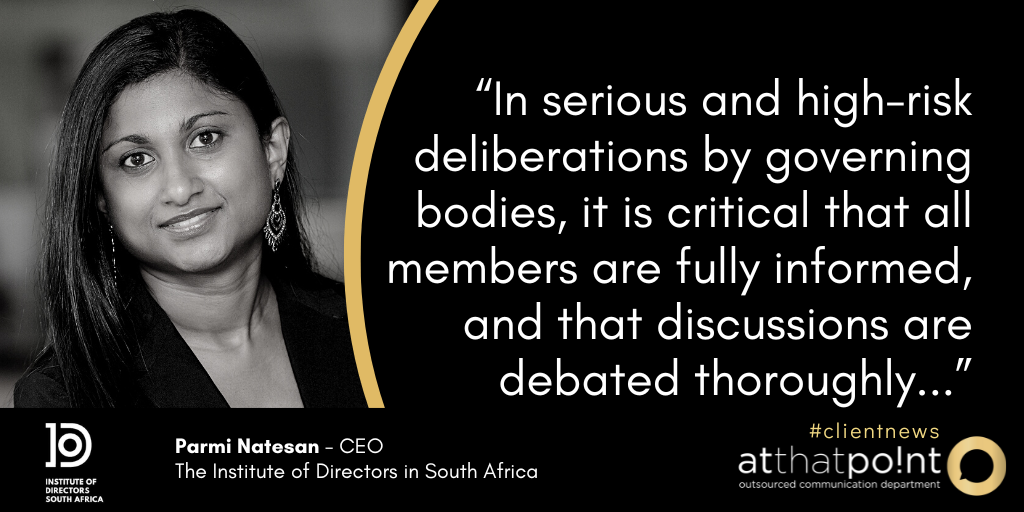 Reports of the unfolding developments at the University of Cape Town suggest deviations from governance best practice, says the Institute of Directors in South Africa (IoDSA). These include that the UCT Council “was split down the middle about the need for an independent judicial commission of enquiry into allegations of mismanagement and poor corporate governance”,[1] and that potentially implicated members of the Council were allowed to cast a vote in the matter. A key principle of good governance is that individuals on governing bodies need to be aware of conflicts of interest, and declare them upfront. Conflicted governing-body members should then recuse themselves from any business or decisions that relate to their conflict. King IV makes this very clear. Principle 1 of King IV is that “The governing body should lead ethically and effectively”, with Recommended Practice 1 (a)(ii) reading: “Members of the governing body should avoid conflicts of interest. In cases where a conflict cannot be avoided, it should be disclosed to the governing body in full at the earliest opportunity, and then proactively managed as determined by the governing body and subject to legal provisions.” An IoDSA guidance note goes on to advise that “A key function of a chair is to manage conflicts of interest. It is not sufficient merely to table a register of interests. All internal and external legal requirements must be met. The chair must ask affected directors to recuse themselves from discussions and decisions in which they have a conflict unless they are requested to provide specific input, in which event they should not be party to the decision.” In this instance, if the reports of potentially implicated Council members being allowed to vote on a matter that concerned them intimately are true, this would constitute a departure from governance best practice. Certainly, a large section of the Council seems to believe that such an unethical decision was taken, and has gone public with its disagreement. This in turn is attracting unfavourable media attention, and may imperil the ability of the governing body to function effectively in the future. Whatever the rights and wrongs, the very existence of such a profound split in a governing body on such an important matter is also a concern. “In serious and high-risk deliberations by governing bodies, it is critical that all members are fully informed, and that discussions are debated thoroughly and ultimately culminate in a decision that has the backing of the entirety, or at least the vast majority, of the governing body which is collectively responsible,” concludes Ms Natesan. [1] Andriaan Basson and Marvin Charles, “UCT crisis deepens as 13 top council members slam ‘irregular, flawed’ meeting”, News 24 (7 October 2022), available at https://www.news24.com/news24/southafrica/news/breaking-uct-crisis-deepens-as-13-top-council-members-slam-irregular-flawed-meeting-20221007. ENDS MEDIA CONTACT: Stephné du Toit, [email protected], 084 587 9933, www.atthatpoint.co.za For more information on the IoDSA please visit: Website: www.iodsa.co.za Twitter: @The_IoDSA LinkedIn: Institute of Directors South Africa Company Page Facebook: Institute of Directors South Afric 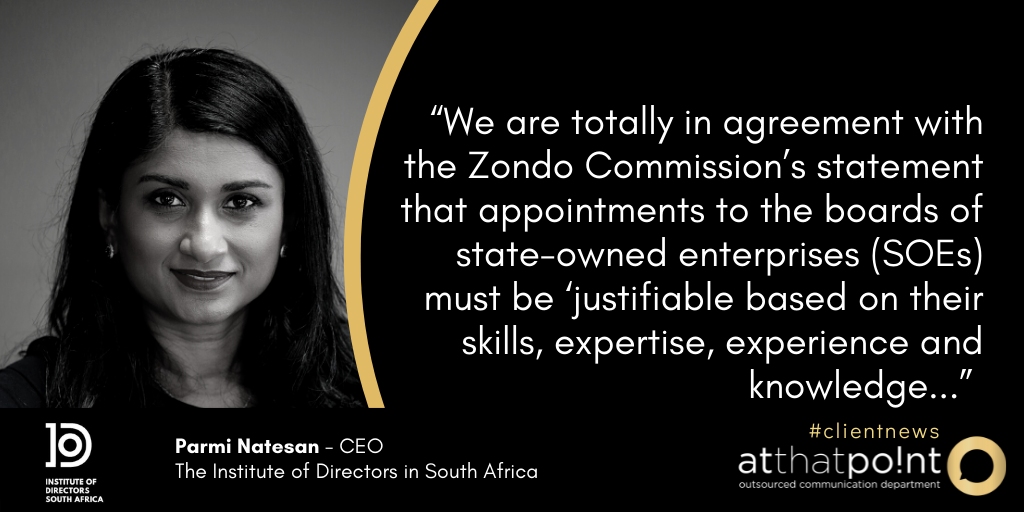 The Institute of Directors in South Africa (IoDSA) broadly welcomes the recommendation to establish a Standing Appointment and Oversight Committee to strengthen the process of nominating and appointing directors of state-owned enterprises. The recommendation was made in the final volume of the report of the Judicial Commission of Inquiry into State Capture (Zondo Commission).[1] “We are totally in agreement with the Zondo Commission’s statement that appointments to the boards of state-owned enterprises (SOEs) must be ‘justifiable based on their skills, expertise, experience and knowledge’[2], and that the state, through the responsible ministers, has signally failed to appoint the ‘right kind of people’[3] to the boards of SOEs,” says Parmi Natesan, CEO, IoDSA. “This is an issue that the IoDSA has repeatedly raised, and which is covered in King IV. The notion that board members should be appointed based on the needs of the organisation is revolutionary in the South African context, where political appointments have effectively collapsed the public sector.” Principle 7 of King IV states that: The governing body should comprise the appropriate balance of knowledge, skills, experience, diversity and independence for it to discharge its governance role and responsibilities objectively and effectively. This goal is particularly hard to attain for SOEs because the state, as the sole shareholder, has the power to make appointments unilaterally. In the sector supplement for SOEs, King IV advises SOEs and executive authority to collaborate in the nomination process and to make it transparent. King IV requires the nomination of any board candidate to take into account the needs of the governing body in terms of skills, knowledge and experience, the governing body’s diversity, and whether the candidate meets the “appropriate fit and proper criteria”.[4] Ms Natesan argues that these criteria should include the IoDSA’s Director Competency Framework.[5] Given the reality that the state has power that shareholders in the private sector do not, the Zondo Commission’s recommendation that a committee be set up to govern the process of nominating and electing SOE board members is a good one. In fact, in a letter to the Commission in September 2021, the IoDSA recommended the establishment of a consistent and transparent nominations process that included a nominating panel comprising representatives of appropriate stakeholder interests. “The Commission’s recommendation is actually much stronger because it seemingly envisages that the proposed committee would have the power to control the nomination process even against the wishes of the executive in order to secure the future of the SOE,” Ms Natesan says. “Our only disappointment is that the list of persons to serve on the oversight committee does not include a representative of the IoDSA, preferably somebody who holds one of our SAQA-registered directorship designations and who would be in a position to provide expert input on the directorship role and the competencies required.” ENDS [1] Judicial Commission of Inquiry into Allegations of Capture, Corruption and Fraud in the Public Sector Including Organs of State, Report: Part VI, Volume 4: Summary of Recommendations 247, p 181, available at www.statecapture.org.za/site/files/announcements/672/OCR_version_-_State_Capture_Commission_Report_Part_VI_Vol_IV_-_Recommendations.pdf. [2] Ibid 6, p 2. [3] Ibid 112, p 41. [4] IoDSA, Report on Corporate Governance for South Africa 2016, p 15, available at https://www.iodsa.co.za/page/king-iv. [5] Available at www.iodsa.co.za/resource/collection/56E77A6D-56E7-46EF-86EF-B425DD00EA9B/Director_Competency_Framework.pdf. MEDIA CONTACT: Stephné du Toit, [email protected], 084 587 9933, www.atthatpoint.co.za For more information on the IoDSA please visit: Website: www.iodsa.co.za Twitter: @The_IoDSA LinkedIn: Institute of Directors in South Africa Company Page Facebook: Institute of Directors South Africa Auditor General’s local government report: local government should be professionalised, says IoDSA21/6/2022 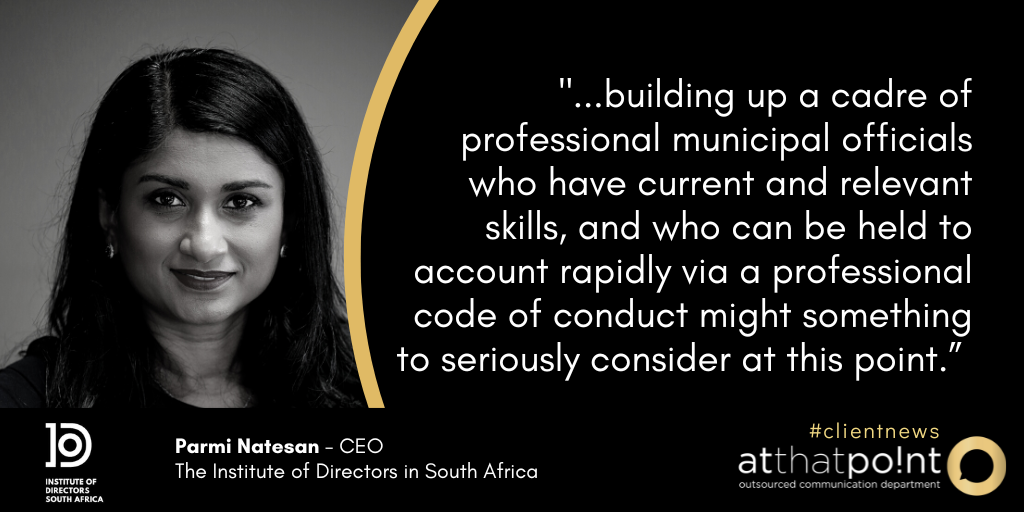 The recent report on local government by the Auditor General, Tsakani Maluleke, is a timely reminder of the prevailing dysfunction in municipalities across the country, and the catastrophic impact that is having on all South Africans. The Auditor General is right to lay the blame squarely on the shoulders of municipal leaders, says Parmi Natesan, CEO, Institute of Directors in South Africa (IoDSA)—but perhaps we also need to be talking about professionalising municipal management as well. “There’s a reason that King IV’s first principle concerns leadership because ultimately everything stems from what goes on at the board or council. Principle 1 speaks to the absolute need for ethical leadership, while Principle 10 deals with the imperative to delegate the council’s authority to a competent municipal manager on whom it can rely,” she argues. “King IV’s sector report on municipalities further recommends that councils ensure they have access to ‘professional and independent guidance on corporate governance and its legal duties’ (King IV, p 85).” The theme of the Auditor General’s Consolidated General Report is “Capable leaders should demonstrate change by strengthening transparency and accountability”. The corollary is that we have now to ask whether municipal councils and audit committees have the right leadership of ethical and effective leaders. What criteria are used to appoint municipal councillors and do we know precisely what competencies they need to have in order to discharge their duties properly? she asks, noting that, as the Auditor General pointed out in her report, senior municipal management has been dilatory at best in implementing the detailed recommendations contained in previous reports. Ms Natesan concurs, saying that this state of affairs seems to be the result of decades of incompetence and even criminal behaviour. “However, as noted, the buck stops with the municipal council. Councils are gravely at fault because they do not hold senior management to account for how they fulfil their duties, and they should, in turn, be held accountable,” she says. Constitutionally, the national and provincial governments are bound to assist in strengthening and supporting municipalities to operate effectively (Constitution of the Republic of South Africa, 1996, s154(1)). Section 139 sets out how, in extreme cases, provincial governments can intervene in local government. But, says, Ms Natesan: “Given that these interventions do not necessarily seem to solve the problem, not least because everything is so politicised, are we now not overdue in simply professionalising local government? Municipalities are where most of the really important service delivery actually occurs—or doesn’t occur. As we seem to be entering a period of unstable municipal coalitions that could make the council’s leadership role even less effective, building up a cadre of professional municipal officials who have current and relevant skills, and who can be held to account rapidly via a professional code of conduct might something to seriously consider at this point.” ENDS MEDIA CONTACT: Stephné du Toit, [email protected], 084 587 9933, www.atthatpoint.co.za For more information on the IoDSA please visit: Website: www.iodsa.co.za Twitter: @The_IoDSA LinkedIn: Institute of Directors in South Africa Company Page Facebook: Institute of Directors South Africa  Recent events in both the public and private sectors are again highlighting the key role that proper succession planning plays in supporting any organisation’s sustainability, particularly when it comes to CEOs and governing-body chairs. Poor succession planning inevitably creates a leadership vacuum at both governing body and executive management level resulting in a loss of the longer term strategic focus. The impacts of this uncertainty can be dire, says Richard Foster, facilitator at the Institute of Directors in Southern Africa (IoDSA). Impacts can include a loss of performance delivery influenced by such factors as possible churn at the senior management level, the loss of market share to more focused competitors, severe reputational damage and erosion of investor and other key stakeholder confidence in both the governing body and senior management alike. “Because good governance relies on effective leadership, succession planning receives significant focus in King IV. In addition, its five sector supplements deal with the specific issues relating to succession planning in different contexts,” Mr Foster notes. The position is particularly complex when it comes to state-owned entities (SOEs) because certain appointments like the CEO and governing-body chair are typically mandated in legislation or founding documents. The shareholder thus plays a key role, and the process is not as easily aligned with what is considered governance best practice, he says. A similar situation exists in local government. One mark of the difficulties of proper succession planning at SOEs is the reliance on interim appointments. However, they inevitably create uncertainty unless they are well thought-through and the process is properly communicated to stakeholders. “One of the governing body’s primary functions is to create and oversee the implementation of strategy, implying a three-to-five-year, or even longer timeline. Interim appointments, by contrast, tend to be operationally focused pending a permanent appointment,” he says. King IV recommends that governing bodies should ensure succession plans exist for their own members, as well as for the CEO and executive management team. However, because succession planning is intimately connected with the appointment of these senior office-bearers, succession planning for SOEs is, as previously mentioned, more complex and challenging. Typically, the shareholder/executive authority (ultimately the government) has the power (or obligation) to appoint the chair and/or the CEO and/or other governing-body members. In its SOE Sector Supplement, King IV recommends that these appointments should be accomplished via a robust and transparent process that involves the governing body (the accounting authority) as much as possible to give effect to the aspirations of the relevant principle. “The processes for appointing CEOs or chairs at certain SOEs is sometimes questioned. The damage caused by unsuitable appointments is now plain, and both the organisations and the economy as a whole are affected,” he says. To align succession planning in SOEs better with governance best practice, the King IV SOE Sector Supplement recommends that the CEO’s letter of appointment should clearly state that the CEO is accountable to the governing body (rather than the executive authority i.e. shareholder), that the governing body and CEO jointly agree on how the CEO’s performance should be measured, and that the governing body has the primary responsibility for firing the CEO. “It is encouraging that Government seems to have now recognised that good corporate governance requires ethical and effective leadership, and that increased focus appears to have been placed on the succession planning and attendant appointment process,” Mr Foster concludes. “The consequences of not following the recommended practices of good governance are now plain to see.” ENDS MEDIA CONTACT: Idéle Prinsloo, 082 573 9219, [email protected], www.atthatpoint.co.za For more information on the IoDSA please visit: Website: www.iodsa.co.za Twitter: @The_IoDSA LinkedIn: Institute of Directors in Southern Africa Company Page The first reports and disclosures in line with King IV principles are beginning to appear. King IV is effective in respect of financial years starting on or after 1 April 2017. It would appear that certain organisations still require a deeper understanding of the implications of King IV’s “apply and explain” approach, says Richard Foster, a governance advisor, professional non-executive director and Institute of Directors in Southern Africa (IoDSA) facilitator.
“King III’s ‘apply or explain’ regime had the unintended consequence of allowing organisations to adopt something of a tick-box approach to reporting and compliance. The new approach signals a decisive departure from that way of doing things because it requires organisations to explain how they have applied the 17 principles of King IV,” he says. “The idea is to give stakeholders a real idea of what the organisation is doing to embody the code and the quality of its governance—and how it is using the code to achieve all of this.” The key here is the requirement to explain. Explanation means that stakeholders can easily ascertain whether the organisation is making satisfactory progress towards good governance. It also, to quote Professor Mervyn King, the convenor of the King Committee in his foreword to King IV, “encourage[s] organisations to see corporate governance not as an act of mindless compliance, but something that will yield results only if it is approached mindfully, with due consideration of the organisation’s circumstances.”Foster suggests the approach should be welcomed because it provides a great deal of flexibility in line with the principle of proportionality. Organisations are now free to adapt how they give effect to the Principles of King IV in line with aspects such as their risk profiles, level of complexity, resources, impact on the triple context and other specific circumstances—provided they explain clearly what their thinking was. “Disclosure under King IV directs us away from a quantitative approach to compliance (‘We have implemented the following recommended practices’ or ‘We have implemented all recommended practices except’) to a qualitative one (‘In order to give effect to this Principle of good governance, we have taken the following actions’),” he explains. “The Principles are generic and can be applied to any organisation, what’s unique is how each organisation crafts that application to achieve the goals or outcomes corporate governance: ethical culture, effective control, good performance and legitimacy.” The challenge that organisations now face is that they have to engage deeply with the spirit of corporate governance, rather than its letter. That engagement, and the actions that flow from it, need to be informed by an ethical framework. In practical terms, governance reporting in terms of King IV cannot be done satisfactorily in tabular form. Rather, a narrative approach, guided by materiality, should be used to explain how the organisation understands the Principle in its specific context and what it seeks to achieve; and then what practices were implemented in order to achieve the necessary application of that Principle. King IV allows organisations to deliver their governance reports in various ways as best suits their circumstances: either as a standalone report, or as part of the integrated report or some other report as they consider appropriate for their stakeholders. According to Parmi Natesan, Executive: Centre for Corporate Governance, the IoDSA has recently published its own governance report which can be used as an example of the envisaged approach. A significant amount of time and thinking went into how we wanted to tell our governance story, to enable our stakeholders to make an informed assessment of the quality of the IoDSA’s governance. “Reporting under King IV is all about understanding corporate governance and then explaining how you have implemented it; it’s not about keeping a register of which rules you have followed,” Foster concludes. “It’s highly flexible but it does require organisations truly to engage with what they are doing to improve governance, and what they hope to achieve.” ENDS MEDIA CONTACT: Juanita Vorster, 079 523 8374, [email protected], www.atthatpoint.co.za For more information on the IoDSA please visit: Website: www.iodsa.co.za Twitter: @The_IoDSA LinkedIn: Institute of Directors in Southern Africa Company Page Directors’ duties are largely misunderstood. Recent media coverage of Steinhoff, EOH and Multichoice bring these duties directly under the spotlight.
Parmi Natesan, Executive: Centre for Corporate Governance at the Institute of Directors in Southern Africa (IoDSA), says that in South Africa, directors’ duties as set out in our common law and in the Companies Act include the fiduciary duty to act in good faith and for a proper purpose in the best interests of the company and also acting with due care, skill and diligence. Directors could be subject to criminal sanctions like fines, jail time, and even disqualification from serving as a director in future, if they have failed to perform their duties. However, these duties and related potential liabilities should not prevent directors from taking the necessary bold decisions that are often required to drive growth and success. Business is ultimately all about taking risk in order to gain reward. Equally, it is accepted that directors can take decisions that turn out to be wrong or result in loss. What is commonly known as the Business Judgment Rule essentially outlines how directors can defend their decisions if they are able to demonstrate that they satisfied the obligations of acting in the best interests of the company and with the required care of skill, in that they; took reasonably diligent steps to be informed about the matter and access the correct information, had a rational basis to believe that their decision was in the best interests of the company at the time, and that they had no personal financial interest in the matter. In order to be better informed, non-executive directors, who are not involved in the day to day business of the organisation particularly in large and complex organisations such as those referred to earlier, rely heavily on assurances from management, internal audit, and external audit as well as board committees such as the Audit Committee. They must, however, take reasonable steps to ensure the information is accurate and that they understand it prior to making any decisions. Apart from the law, the governance code in South Africa, King IV, sets out the expected governance best practice. In relation to the allegations at the companies in question, King IV contains specific principles and practices around ethical conduct, good corporate citizenship, compliance with laws, rules, codes and standards, fraud, corruption as well as risk and tax governance. It further outlines oversight and monitoring of implementation and execution by management as one of the four primary governance roles and responsibilities of the board within the dynamic business cycle of the organisation “Good governance does not exist apart from the law and a corporate governance code that applies on a voluntary basis may also trigger legal consequences,” says Richard Foster, IoDSA facilitator. “A court considers all relevant circumstances in determining the appropriate standard of conduct for those charged with governance duties, including what the generally accepted practices are. Given that the provisions of voluntary codes of governance find their way into jurisprudence and become part of the common law, failure to meet an established corporate governance practice, albeit not legislated may also invoke liability,” says Foster. Natesan says that King IV is a useful reference point for governance best practice, if it is applied as intended – i.e. meaningful application in a value adding manner to achieve certain outcomes. “An organisation can tick all the boxes, have all the structures, processes, and documents in place, but that does not mean they have good governance.” In King IV, good governance is defined as ethical and effective leadership that achieves the governance outcomes of ethical leadership, good performance, effective control and legitimacy. In a recent BizNews article, Nic Frangos is quoted as saying, “If you have a CEO with no integrity, King Ten wouldn’t suffice. On the other hand, for someone with the integrity of an Adrian Gore (CEO of Discovery), even King One isn’t required.” A few of the directors serving on the boards of these companies are members of the IoDSA. However, the institute is a voluntary body that has no statutory power to appoint, remove or take punitive action against directors, says IoDSA CEO Angela Cherrington. This responsibility lies with regulators, the courts and other statutory bodies like the CIPC. “The IoDSA can nevertheless revoke membership from individuals if they are found to be in contravention of our member code of conduct. The same applies to those who carry the IoDSA’s Chartered Director SA or Certified Director professional designations. There are currently no Chartered Directors SA on the boards of Steinhoff, EOH and Multichoice.” ENDS MEDIA CONTACT: Juanita Vorster, 079 523 8374, [email protected], www.atthatpoint.co.za For more information on the IoDSA please visit: Website: www.iodsa.co.za Twitter: @The_IoDSA LinkedIn: Institute of Directors in Southern Africa King IV shifts focus to outcomes and accessibility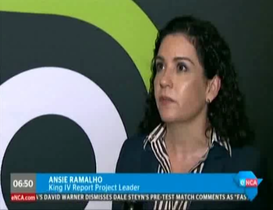 Ansie Ramalho, King IV Project Lead, speaking at a press conference in Johannesburg on 31 October 2016 Ansie Ramalho, King IV Project Lead, speaking at a press conference in Johannesburg on 31 October 2016 The King IV Report on Corporate GovernanceTM (King IV) was launched on 1 November 2016 by the King Committee and the Institute of Directors in Southern Africa (IoDSA), which owns the intellectual rights to the King Reports and the governance codes they contain. The King Reports, of which this is the fourth iteration, contain the philosophy, principles and leading practices for corporate governance in South Africa. “The overarching objective of King IV is to make corporate governance more accessible and relevant to a wider range of organisations, and to be the catalyst for a shift from a compliance-based mindset to one that sees corporate governance as a lever for value creation ,” says Prof Mervyn King, chair of the King Committee on Corporate Governance in South Africa. To make the Report more accessible, Ansie Ramalho, King IV Report Project Lead for the IoDSA, and the task team appointed by the King Committee, have introduced a number of innovations. They have broadened the language of the Report, ensuring that the vocabulary is no longer listed company and business-specific, and have provided supplements to make it easier to adapt the Code to different industry sectors, including government and non-profits, and various organisation types. King IV also provides guidance on how to apply its practices proportionally, in line with an individual organisation’s size and resources, and the extent and complexity of its activities. In addition, King III’s 75 principles have been reduced to a mere 16 in King IV, with an additional 17th principle which is applicable to institutional investors such as retirement funds and insurance companies. At a deeper level, King IV has taken the decisive step of focusing on outcomes as a way of driving acceptance of corporate governance as integral to value creation by organisations characterised by an ethical culture, good performance, effective control and legitimacy. Linking governance to outcomes should result in organisations practising quality governance. In this spirit, King IV emphasises not what practices have been implemented but rather what their impact has been on achieving the 16 principles. King IV has moved the regimen of “apply or explain” to “apply and explain”. “Apply and explain” introduces a qualitative approach to the implementation of King IV’s recommendations. Governing bodies now have greater flexibility in how they implement the recommended practices to achieve the goals articulated in the principles, but they have to be transparent about how they did so. The intent is for the reader of the explanation to be able to make an informed decision about whether the organisation has or has not achieved the principles and realised the four outcomes of ethical culture, performance in a sustainable manner, effective controls and legitimacy. Other important issues covered by King IV include the wage gap, shareholders voting on remuneration policies and their implementation so as to trigger engagement with the company and the composition of the governing body. “King IV is the product of wide consultation, and belongs to all South Africans – organisations and individuals – to whom good governance matters,” says Ramalho. “The wish of the King Committee and the IoDSA is that King IV be welcomed as making it easier to understand what the purpose of corporate governance is, and to apply it to achieve the creation of value. King IV aims to make corporate governance understandable beyond the circle of consultants, technicians and academics. Prof King said it would be the committee’s greatest reward if King IV is adopted by all organisations across all sectors with a consequent consistent practice of quality governance. King IV will be available via app download from App Store or Galaxy App Store, or via a digital read-only copy from www.iodsa.co.za. Printed copies will be available for purchase through Lexis Nexis. ENDS MEDIA CONTACT: Cathlen Fourie, 082 222 9198, [email protected], www.atthatpoint.co.za For more information on the IoDSA please visit: Website: www.iodsa.co.za Twitter: @The_IoDSA LinkedIn: The Institute of Directors in Southern Africa group |
Archives
July 2024
Categories
All
|

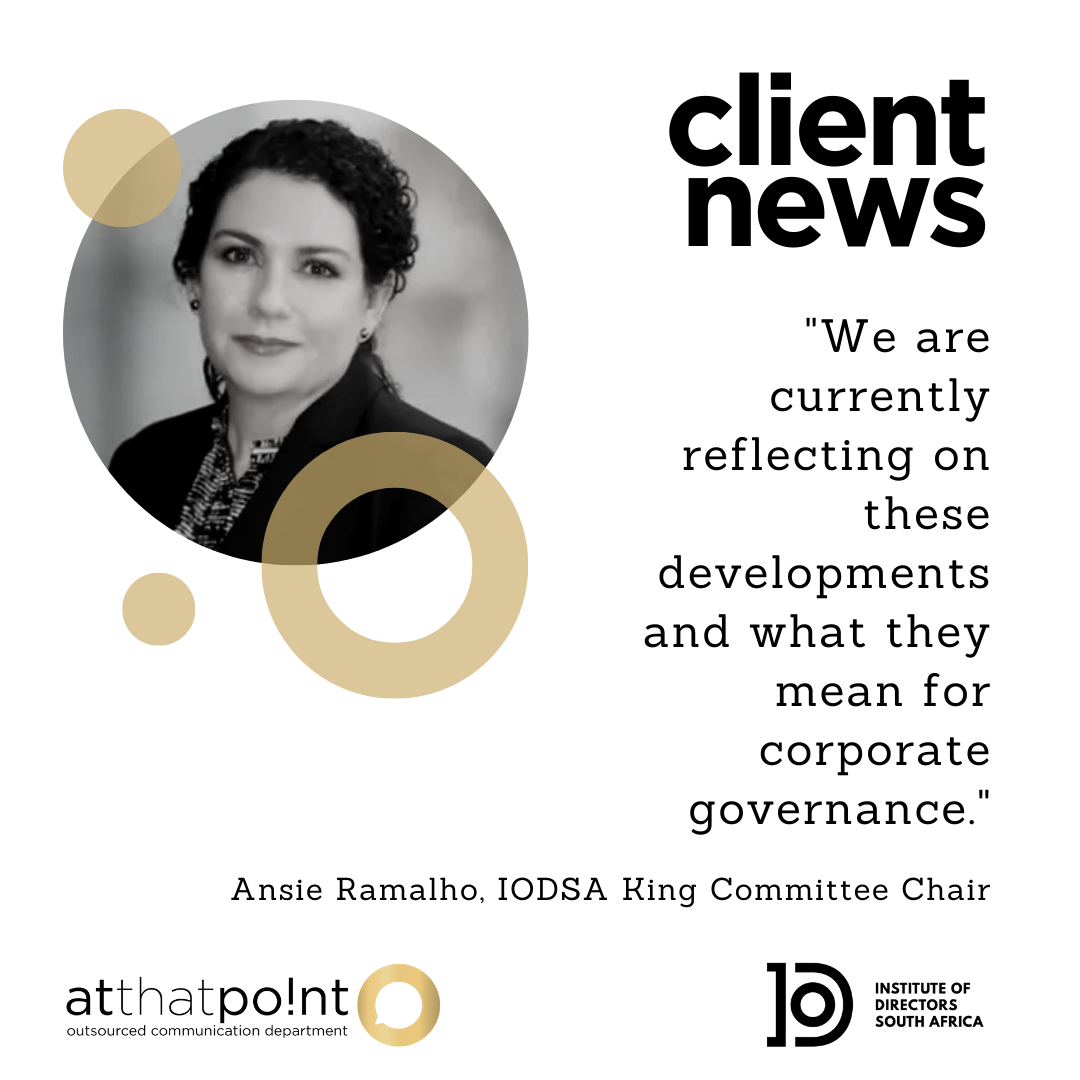
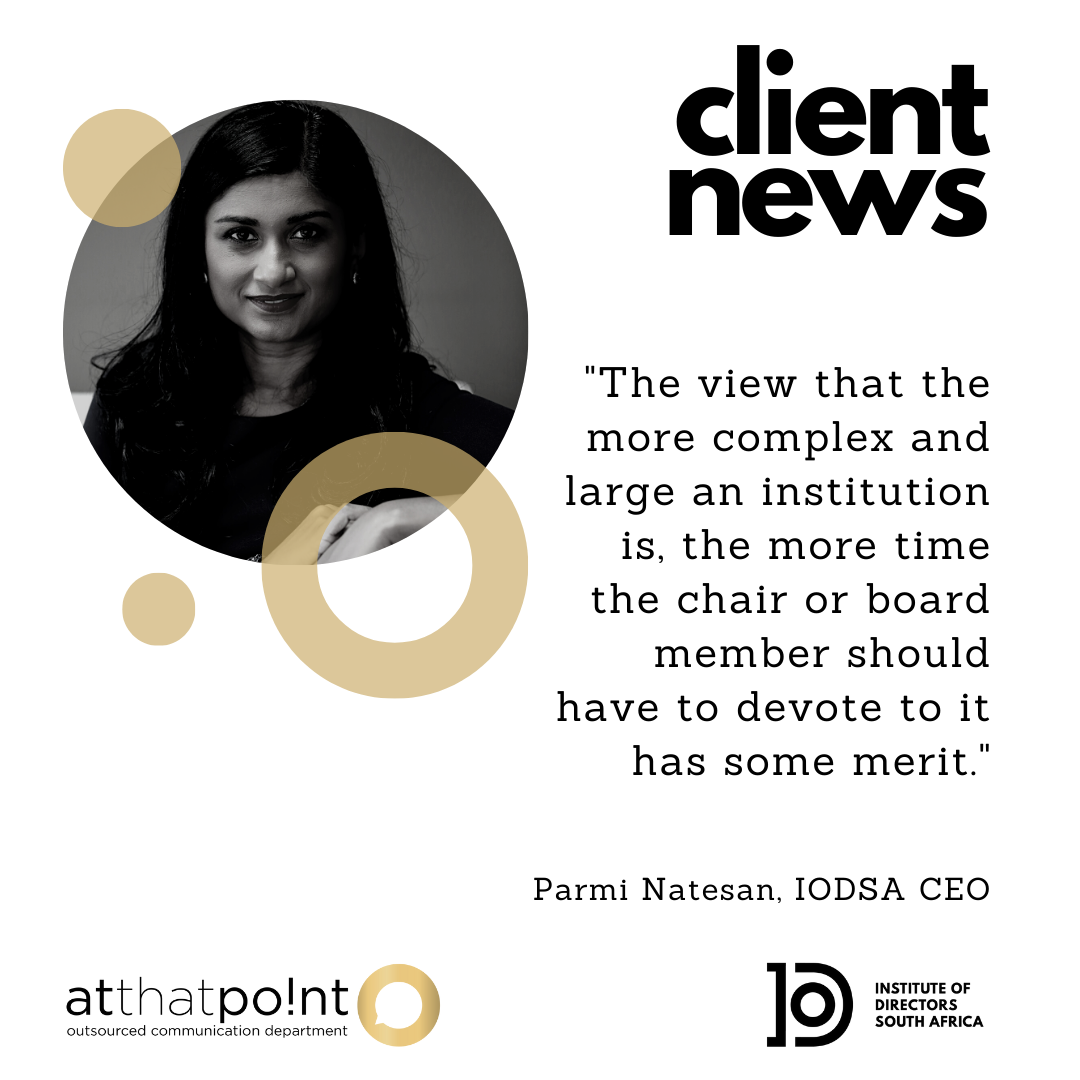
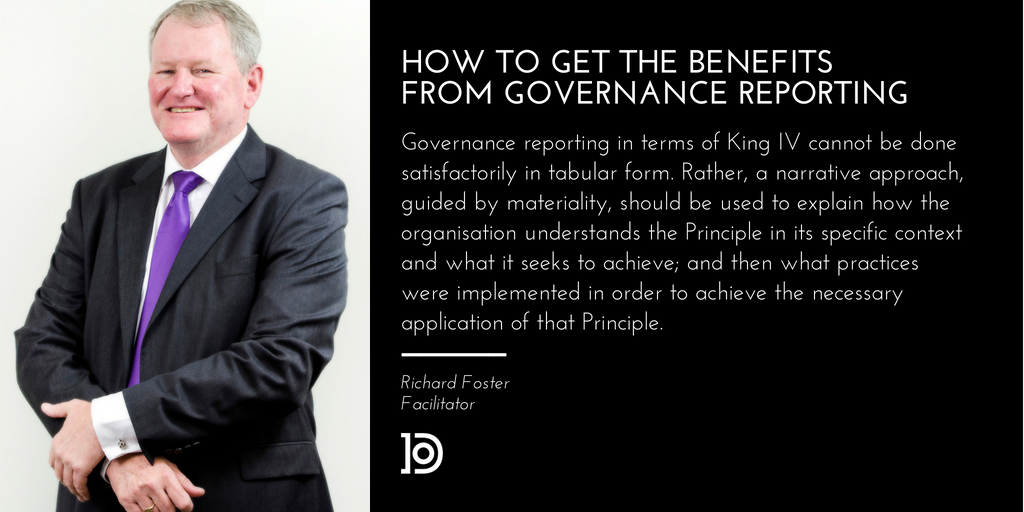

 RSS Feed
RSS Feed